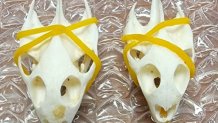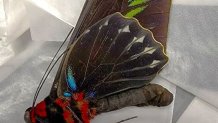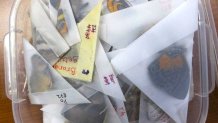
Turtle skulls, crocodile skins, sea cucumbers and elephant toenails are among the thousands of contraband animal and plant products seized by authorities in that last few months at Los Angeles International Airport.
The items seized by U.S. Customs and Border Protection and U.S. Fish and Wildlife Service officials were being transported in violation of wildlife laws and international endangered species regulations.
The agencies seized a total of 4,227 such items between Oct. 1 and mid-May.
“Illegal wildlife trafficking is one of the most profitable natural resource crimes,” said Andrew H. Douglas, CBP Port Director of Los Angeles International Airport. “It encompasses the harvesting and selling of wildlife, and wildlife products, to be used as medicine, fashion, food, or pets sold to consumers.”
Get top local stories in Southern California delivered to you every morning. Sign up for NBC LA's News Headlines newsletter.
Here are some examples of the contraband products:
- Crocodile skulls, jerky, belts, wallets
- Taxidermy baby crocodiles
- Turtle skulls, skins
- Kangaroo meat, tails, ears
- Elephant toenails
- Exotic butterflies
- Peacock feathers
- Seashells, coral, sea cucumbers
- Shark cartilages
- Sea lion oil gelcaps
The items arrived at LAX in individual packages from Singapore, Vietnam, Australia, China, Thailand, the United Kingdom Mexico, and Peru. The packages were heading to locations throughout the United States.
Local
Get Los Angeles's latest local news on crime, entertainment, weather, schools, COVID, cost of living and more. Here's your go-to source for today's LA news.
“The USFWS Office of Law Enforcement’s Wildlife Inspection Program meticulously inspects shipments of known and suspected wildlife to facilitate its legal trade and interdict illegal shipments of wildlife before they enter or leave the country,” said Edward Grace, assistant director of the USFWS Office of Law Enforcement. “Their diligent work safeguards protected species of wildlife and upholds laws and regulations protecting against the unlawful exploitation of nature’s valuable resources.”
The Fish and Wildlife Service regulates international transport of wildlife in and out of the United States. The agency works to protect animals and plant, and prevent the exploitation of nature's resources.








